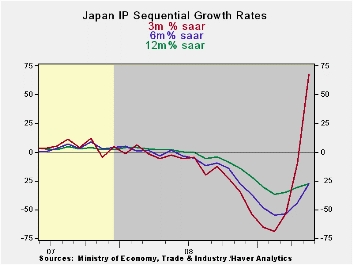 Global| Jul 13 2009
Global| Jul 13 2009Japan IP Is In A Strong Quarterly Recovery
Summary
Japan’s consumer confidence is at a year and one half high. The government has upgraded its economic assessment for the third month in a row. Industrial output is on a tear. IP is up for three months in a row. The past two month’s [...]

Japan’s consumer confidence is at a year and one half high.
The government has upgraded its economic assessment for the third month
in a row. Industrial output is on a tear. IP is up for three months in
a row. The past two month’s gains were on monthly increases of better
than 5.5% each. With the Yr/Yr month growth rate at -27.6%, over three
months Japan’s IP is up at an annualized pace of 67.8%.
Textiles, mining and investment goods are major groups with
declines over three months. It is interesting and telling that for
Japan investment goods output has lagged so badly. Despite high
unemployment virtually everywhere Japan’s consumer goods output is up
and investment goods output has been decaying. This month for the first
time in eight months investment goods output has rising on the month.
The business sector has been very hard hit by recession around the
globe. Although consumers have been hurt by unemployment and fears of
unemployment, consumer most consumers still hold their jobs. Some of
the displaced workers fallback on government programs and then there is
stimulus spending to try and prime the various economic pumps.
Maybe this month’s output increase of investment goods signals
that the forces of growth are finally going to include the business
sector and that investment projects have been cut back and postponed
all that is possible. But one observation is too thin a reed to seize.
For now we can only watch the output reports and look to the corporate
earnings reports that will probably remain downbeat. Whenever stirring
in the industrial sector is in progress in this cycle it seems to be
mild and small compared to past declines. Germany is showing some
stirring in its international business orders. Japan now has one-month
rise in investment goods output. We think the business sector will mark
time for a while longer and that the spread of the end-recession and
eventually of the recovery to investment goods is still a work in
progress that is lagging behind the consumer recovery.
| Japan Industrial Production Trends | ||||||||
|---|---|---|---|---|---|---|---|---|
| m/m % | Saar % | Yr/Yr | Qtr-2-Date | |||||
| Seasonally adjusted | May-09 | Apr-09 | Mar-09 | 3-mo | 6-mo | 12-mo | Yr-Ago | % AR |
| Mining&MFG | 5.7% | 5.9% | 1.6% | 67.8% | -27.8% | -27.6% | 2.3% | 35.2% |
| Total Industry | 5.8% | 5.4% | 1.3% | 63.1% | -27.0% | -26.8% | 2.2% | 31.7% |
| MFG | 5.5% | 5.9% | 1.7% | 66.9% | -28.0% | -27.7% | 2.2% | 35.5% |
| Textiles | -1.5% | 3.2% | -5.7% | -15.3% | -29.1% | -22.0% | -7.2% | -15.5% |
| T-port | 28.3% | 7.3% | 3.9% | 317.9% | -43.8% | -42.3% | 7.6% | 80.8% |
| Product Group | ||||||||
| Consumer Goods | 6.3% | 8.6% | 1.4% | 88.1% | -17.2% | -17.3% | 3.4% | 52.2% |
| Intermediate Goods | 7.6% | 9.5% | 3.4% | 120.4% | -27.6% | -29.7% | 4.5% | 75.3% |
| Investment Goods | 2.2% | -5.6% | -2.2% | -20.6% | -45.3% | -35.2% | -3.3% | -37.3% |
| Mining | -3.5% | 1.0% | -4.0% | -23.4% | -22.2% | -12.3% | -3.6% | -19.2% |
| Electric&Gas | 2.2% | -0.3% | -0.7% | 4.6% | -13.1% | -7.7% | 1.6% | -3.7% |
Robert Brusca
AuthorMore in Author Profile »Robert A. Brusca is Chief Economist of Fact and Opinion Economics, a consulting firm he founded in Manhattan. He has been an economist on Wall Street for over 25 years. He has visited central banking and large institutional clients in over 30 countries in his career as an economist. Mr. Brusca was a Divisional Research Chief at the Federal Reserve Bank of NY (Chief of the International Financial markets Division), a Fed Watcher at Irving Trust and Chief Economist at Nikko Securities International. He is widely quoted and appears in various media. Mr. Brusca holds an MA and Ph.D. in economics from Michigan State University and a BA in Economics from the University of Michigan. His research pursues his strong interests in non aligned policy economics as well as international economics. FAO Economics’ research targets investors to assist them in making better investment decisions in stocks, bonds and in a variety of international assets. The company does not manage money and has no conflicts in giving economic advice.
More Economy in Brief
 Global| Feb 05 2026
Global| Feb 05 2026Charts of the Week: Balanced Policy, Resilient Data and AI Narratives
by:Andrew Cates






